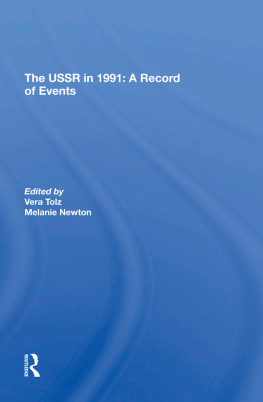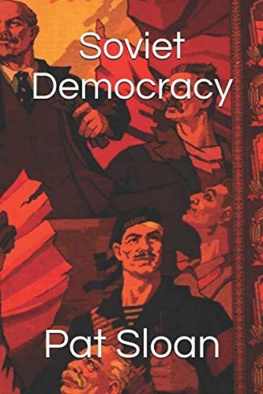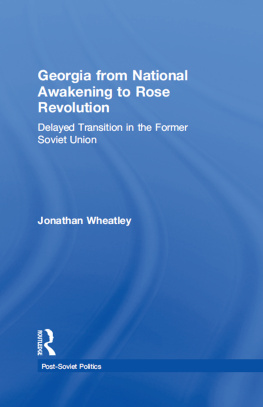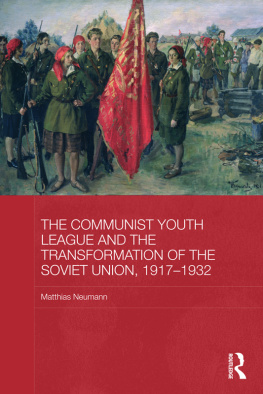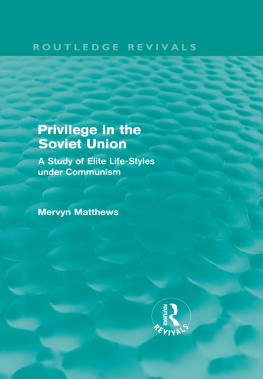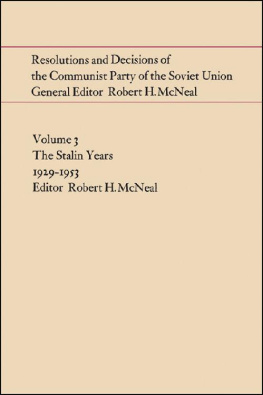I SSUES IN G LOBALIZATION
Edited by
Stuart Bruchey
Alan Nevins Professor Emeritus
Columbia University
I SSUES IN G LOBALIZATION
S TUART BRUCHEY , General Editor
S OCIAL P ARTNESHIPS AND S OCIAL
R ELATIONS
New Strategies in Workforce and
Economic Development
Janet Boguslaw
G ENDERING E THNICITY
Implications for Democracy
Assistance
Lori Handrahan
G AY L IFE IN THE F ORMER USSR
Fraternity without Community
Daniel P. Schluter
Published 2002 by Routledge
2 Park Square, Milton Park, Abingdon, Oxon OX14 4RN
52 Vanderbilt Avenue, New York, NY 10017
First issued in paperback 2018
Routledge is an imprint of the Taylor & Francis Group, an informa business
Copyright 2002 by Daniel P. Schluter
All rights reserved. No part of this book may be reprinted or reproduced or utilised in any form or by any electronic, mechanical, or other means, now known or hereafter invented, including photocopying and recording, or in any information storage or retrieval system, without permission in writing from the publishers.
Notice:
Product or corporate names may be trademarks or registered trademarks, and are used only for identification and explanation without intent to infringe.
Library of Congress Cataloging-in-Publication Data
Schluter, Daniel P, 1964
Gay life in the former USSR: fraternity without community / Daniel P. Schluter.
p. cm. (Issues in globalization)
Includes bibliographical references and index
ISBN 0-415-93233-5
1. GaysSoviet UnionSocial conditions. 2. Homosexuality Soviet UnionHistory. I. Title. II. Series.
HQ76.3.S653 S38 2001
305.906640947dc21 2001034975
ISBN 13: 978-1-138-99186-6 (pbk)
ISBN 13: 978-0-415-93233-2 (hbk)
... I am gratified anyway by the hope that this heap of raw materials laying before the reader will give him some sort of impression of the history, daily life, and language of the Russian homosexual subculture and will serve as a starting point for future researchers, who now will not have to start in an empty space.
[Vladmir Kozlvsky],
:
[The Argot of the Russian Gay Subculture: Materials for Research]
p. 5
I COULD NOT HAVE COMPLETED THIS STUDY WITHOUT AN IMMENSE AMOUNT OF help and support from several sources, the most important of which were Soviet gay men and lesbians themselves. First and foremost, I must thank my research subjects all across the USSR, hundreds of whom were willing and able to overcome monumental and justifiable fears of disclosure in order to take part in the survey. I am even more indebted to those who were also amenable to discussing their lives openly with me on innumerable occasions and sometimes in dangerous settings.
I must also thank my Soviet cohortsfriends, acquaintances, friends-of-friends, or simply other kindred spiritswho took a personal interest in my work and did much to help me gather the data and the other information necessary for this project. The list is long, but I would like to give special mention to: dik and M. for their aid in developing the questionnaire; Zhnya, Ssha, Vnya, and Aleksy for their help with questionnaire distribution; Gna, Sergy S., Snich, and Vnya for connections and contacts when I needed them. I am also grateful to Sergy K. for his persistent friendship throughout the data-gathering process, despite my erratic, sometimes irascible behavior. Special thanks and gratitude also must go to Galya and Ksnya, who helped me locate Soviet lesbians in a culture that has great difficulty even envisioning the possibility of their existence.
In addition, I am much indebted to Tatyna Semyonovna and Nikoly Ivnovich, staff members at a cooperative medical facility in Moscow, who were instrumental in helping me obtain access to research subjects and provided a forum for presenting and discussing my ideas about gay life in the USSR. Hats off! to them for taking a noble risk in offering public meeting space for Soviet gay men and lesbians when legal measures could have been taken against them for what amounted to aiding and abetting criminal elements. I am thankful also to Soviet scholars, gor S. Kn, Dmtriy D. Isyev, and Teet Veispak, for their advice and encouragement in carrying out this research.
I must also convey much appreciation to some of my American compatriots in Moscow at that time. Brian Harvey, a fellow American researcher in the USSR, provided much-needed comradeship during the adventurous endeavor. Liz McKeon and Todd Weinberg went well beyond the call of duty as International Research and Exchanges Board (IREX) administrative staff in Moscow by safeguarding my data and other research materials for me when I was detained by the KGB and written up in the Soviet press as a possible sex spy.
Research for this project was made possible by the fact that I was in the USSR during the academic year 1990-1991 on fellowships from the United States Department of Educations Fulbright-Hays Research Abroad Program and IREX, under the sponsorship of the USSR Academy of Sciences, to study an aspect of the economic reform program then underway. This research was not funded by those agencies, however, and they bear no responsibility whatsoever for it neither for the way the research was conducted nor for any of the analyses I present here.
Finally, paying homage to those whose work in this area has come before, I am grateful for not having to start in an empty space.
Unfortunately, transliteration systems [for rendering Russian words from Cyrillic into the Latin Alphabet] abound: institutions, editorial offices, and authors use their own systems, and the resultant proliferation confuses the uninitiated and promotes sloppiness among the professionals.... The U.S. Board on Geographic Names transliteration system is used by most U.S. government offices and publications and is preferred by the Chicago Manual of Style and the author.
Genevra Gerhart,
The Russians World: Life and Language
inside front cover.
I N THE TEXT, NOTES, AND REFERENCES FOR THIS WORK, I WILL USUALLY translate key terms and phrases, titles of books and individuals, and names of organizations, as well as quotations, from Russian into Englishwhere English-language equivalents and near-equivalents exist. In doing so, 1 will provide the Russian original for clarification (in parentheses and in cyrillic script). When I translate text for quotations, I will also include such Russian words [in square brackets] in cases in which my translation might be disputable.
It is not always possible or desirable, however, to translate all Russian terms into English. I will therefore occasionally use Russian-language words, transliterated into the Latin alphabet and in italic script, when it is necessary to indicate or explain a term that is not readily renderable in English. Where I do so, I will use the transliteration system of the U.S. Board on Geographical Names (Gerhart 1974:inside front cover), with a few exceptions to facilitate proper pronunciation among non-Russian-speakers. I will add diacritical marks () to indicate stressed syllables; I will transliterate the Russian , which is always stressed, as y or , depending on proper pronunciation; and I will omit hard and soft (palatalization) signs ( and ), which are themselves unpronounced.


